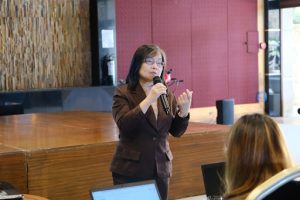Metro Manila – The National Conciliation and Mediation Board (NCMB) successfully concluded the training for its docket officers on the management of the newly developed Alternative Dispute Resolution Information System (ADRIS) in Alta D’ Tagaytay Hotel, Tagaytay City last 15 – 18 November 2022.
The training aimed to equip th e Board’s docket officers with the necessary knowledge to utilize the information system as well as differentiate the new features from the Case Docket and Monitoring System. The new system is designed to cater to the new data demands to effectively craft better policies for efficient case management and monitoring.
e Board’s docket officers with the necessary knowledge to utilize the information system as well as differentiate the new features from the Case Docket and Monitoring System. The new system is designed to cater to the new data demands to effectively craft better policies for efficient case management and monitoring.
 Executive Director Maria Teresita D. Lacsamana-Cancio graced the event and imparted several notes relative to the creation of the system. She encouraged every participant to raise and ask questions no matter how simple or complex the question is because it may help improve the information system. She also highlighted the importance of using the system diligently. “Here now comes the ADRIS [Alternative Dispute Resolution Information System] – a much better version of the CDMS [Case Docket and Monitoring System]. A better one because it is more complete and more comprehensive at mas marami siyang features, pero uulitin ko, walang kwenta ang lahat ng ito if we do not use it properly. This is for improved service delivery to clients.”, ED Cancio said during the conduct of the activity. She also added that a productivity policy and reward system on the accurate and efficient encoding and updating of cases and requests for assistance in the ADRIS can be instituted through the Program on Awards and Incentives for Service Excellence (PRAISE), in coordination with the NCMB Employee’s Association (NCMB-EA), to motivate and persuade docket officers to diligently use the information system.
Executive Director Maria Teresita D. Lacsamana-Cancio graced the event and imparted several notes relative to the creation of the system. She encouraged every participant to raise and ask questions no matter how simple or complex the question is because it may help improve the information system. She also highlighted the importance of using the system diligently. “Here now comes the ADRIS [Alternative Dispute Resolution Information System] – a much better version of the CDMS [Case Docket and Monitoring System]. A better one because it is more complete and more comprehensive at mas marami siyang features, pero uulitin ko, walang kwenta ang lahat ng ito if we do not use it properly. This is for improved service delivery to clients.”, ED Cancio said during the conduct of the activity. She also added that a productivity policy and reward system on the accurate and efficient encoding and updating of cases and requests for assistance in the ADRIS can be instituted through the Program on Awards and Incentives for Service Excellence (PRAISE), in coordination with the NCMB Employee’s Association (NCMB-EA), to motivate and persuade docket officers to diligently use the information system.
Throughout the activity, several issues and concerns regarding the information system were raised and noted by the Research and Information Division staff for discussion and resolution. Sources of data were also discussed to guide docket officers in determining the data in the forms being accomplished by clients relative to the encoding of case/RFA details in the ADRIS.
Overall, the activity provided an avenue for a fruitful discussion for skills enhancement and sharing of insights for improvement of the information system. The ADRIS is scheduled to be fully deployed by the start of 2023. Thereafter, the Phase 2 of the project is set to start to develop the modules for the Labor Management Partnership and Empowerment Program (Labor Management Cooperation and Grievance Machinery).
END/ianne r. go 




 Views Today : 87
Views Today : 87 Total views : 594454
Total views : 594454

